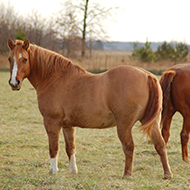
Researchers assess the effect of different parasite control protocols.
Reducing worming intensity does not have any adverse health risks to horses, according to new research.
Writing in the Equine Veterinary Journal, researchers describe their study in which they examined the worm egg count levels, bodyweight and equine health of groups of mares and foals under different parasite control protocols.
The protocols included traditional frequent de-worming and drug rotation, and the currently recommended protocols of less de-worming and more egg counts.
Their study determined that the traditional approach of frequent routine de-worming at pre-determined intervals, without the use of diagnostic testing, is unnecessary.
Study leader Dr Martin Nielsen said that a persistent growing resistance to anthelmintics is challenging researchers to find more sustainable parasite control programmes.
““De-worming every six to eight weeks and rotating between products is still very common around the world, but this sort of carpet bombing is completely unnecessary and drug rotation does not prevent drug resistance," he said.
“Many people are not comfortable with de-worming less frequently, thinking it will compromise horse health, but our study shows that this is not the case; no adverse health effects were seen that could be ascribed to scaling down de-worming intensity.”
BEVA chair of health and medicines David Rendle added: "This study provides further evidence to show that there is no justification for the traditional approach of calendar-based routine treatment and gives further reassurance that the frequency of treatment can be reduced without detriment to equine health or development of youngstock.
"Spreading this information will hopefully encourage any horse owners who have not done so already to change from their old-fashioned habits of frequent de-worming, to a diagnostic test-led, or at least a more strategic approach with routine drug-resistance testing"
Two short videos,one for vets and one for horse owners, have been produced to help explain the findings and for veterianry practices to share with their clients on social media.



 The veterinary mental health charity Vetlife is inviting the veterinary community to join it for a sponsored cold-water dip.
The veterinary mental health charity Vetlife is inviting the veterinary community to join it for a sponsored cold-water dip.